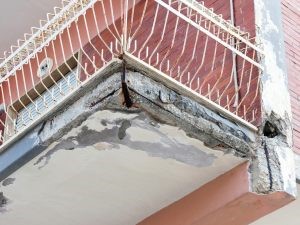
Overhanging balcony and criminal liability of the condominium.
Overhanging balcony and criminal liability of the condominium.
The Supreme Court addresses the problem of falling fragments of plaster or masonry that have detached from the ceiling and the consequent criminal liability of the individual condominium.
Giuseppe Bordolli Scientific director Condominioweb 08/26/2022
The projecting balconies, which protrude from the facade of the building, constitute only an extension of the apartment from which they protrude but do not perform any function of support or necessary covering of the building; consequently they cannot be considered at the service of the overlapping floors and, therefore, the common property of the owners of these floors and the provisions of Article 1125 of the Civil Code cannot apply to them.
In light of the above, it can be said that the maintenance works of the projecting balconies are the sole responsibility of the owner of the apartment from which they protrude.
So in case the poor state of maintenance of the finishing elements of the extrados of the balcony slabs (to be identified in the flooring tiles) cause infiltration problems to the apartment below, it is the responsibility of the owner of the balcony to restore the state of health and repair the damage.
Only the coverings and the elements of the front and the lower part (ceiling or under-balcony) must be considered common to all, but only when they are inserted in the façade of the building and contribute to making it aesthetically pleasing.
If the under-balcony of the projecting balcony is not decorative, the maintenance is up to the individual condominium who uses this building. The latter is therefore also responsible for the damage caused by the fall of fragments of plaster or masonry, which have detached from the ceiling.
This phenomenon, if neglected, can lead the individual condominium to be convicted of the crime referred to in art. 677 of the Criminal Code, paragraph 3 (Omission of works in buildings or constructions that threaten ruin ) .
This figure of crime, currently constructed in the first two paragraphs as an administrative offense following decriminalization of Legislative Decree no. 507 pursuant to art. 52, maintains in paragraph 3 criminal relevance in the event that the situation of ruin of the property results in danger for the person (it must be a concrete danger).
In this regard, the sentence of the Supreme Court n. 31592 of 24 August 2022 .
Jutting balcony and the condominium’s criminal liability: the story
The story began when the Tribunal in monochromatic composition, sentenced some condominiums to the penalty of 400.00 euros as a fine in relation to the crime referred to in art. 677 of the Criminal Code, paragraph 3. The Court considered the accused to be clearly responsible for failing to carry out the necessary work to restore the balconies in the apartments of their respective property in order to remove the danger to people.
In any case, they pointed out that property owners hold a guarantee position that cannot be totally delegated to other figures, such as the administrator of a condominium , with whom they necessarily share the obligation to act even on things not of their exclusive property, even if in subsidiary and in case of inactivity of the latter.
The condominiums appealed in cassation, pointing out that they had always taken care to report the situation of the condominium facade to the administrator and had always participated in the meetings in which, however, the quorum was never reached; consequently they did not believe they had a specific fault, underlining how the responsibility should fall on all condominiums or in any case on those with homes served by their staircase, as the plaster was detached from a condominium part of the facade.
The decision
The Supreme Court has fully shared the Court’s reasoning. According to the supreme judges, in the matter of omission of construction works that threaten ruin in condominium buildings, in the event of failure to form the will of the assembly and failure to allocate funds necessary to remedy the degradation that gives rise to the danger, the responsibility for the crime referred to in art. 677 of the Criminal Code against the condominium administrator for not having implemented interventions (on private parts of the projecting balconies) that are not in his material power , falling in this situation on each individual owner (of the projecting balcony) the legal obligation to remove the dangerous situation.
As noted by the Supreme Court, the defendants remained inert even though they had long been aware of the need to carry out maintenance work and of the ongoing threat of ruin from which parts of their balconies suffered.
It is therefore inevitable to affirm the criminal responsibility of the accused with reference to the crime in question, for not having taken action in order to avoid the event.
Moreover, for the purposes of integrating the crime in question, guilt is sufficient and it is therefore not necessary that the omissive conduct is motivated by a specific desire to avoid the necessary obligations , on the contrary, a negative attitude is also sufficient for that. due to fault.
Source: https://www.condominioweb.com/balcone-aggettante-e-responsabilita-penale-del-condomino.19647
GECOSEI by Giuseppina Napolitano


